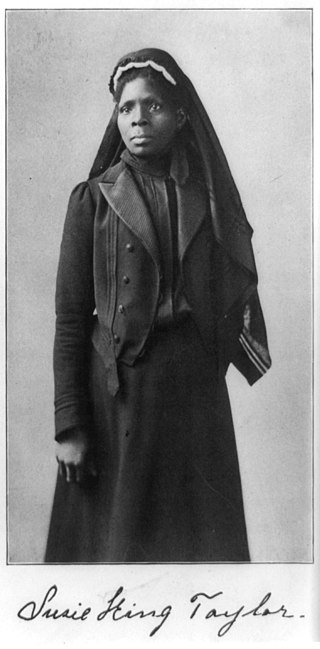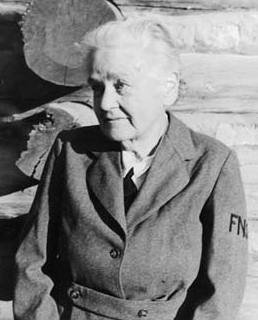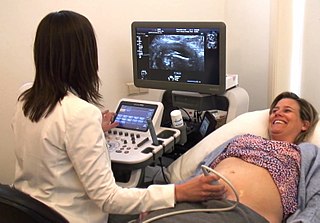Related Research Articles

Midwifery is the health science and health profession that deals with pregnancy, childbirth, and the postpartum period, in addition to the sexual and reproductive health of women throughout their lives. In many countries, midwifery is a medical profession. A professional in midwifery is known as a midwife.

All My Babies: A Midwife's Own Story is a 1953 educational film written, directed and produced by George C. Stoney which was used to educate midwives in the Southern United States and promote greater cooperation between midwifery and the modern health system. It was produced by the Georgia Department of Public Health. The film follows Mary Francis Hill Coley (1900–66) an African American midwife from Albany, Georgia who helped deliver over 3,000 babies in the middle part of the 20th century. On December 17, 2002, it was announced by Librarian of Congress James H. Billington that "All My Babies, George Stoney's landmark educational film used to educate midwives in Georgia and throughout the South" was among the annual selection of 25 motion pictures to be added to the National Film Registry.

Sapelo Island is a state-protected barrier island located in McIntosh County, Georgia. The island is accessible only by boat; the primary ferry comes from the Sapelo Island Visitors Center in McIntosh County, Georgia, a seven-mile (11 km), twenty-minute trip. It is the site of Hog Hammock, the last known Gullah community. It is illegal to visit the island without a permit issued by state tourism authorities.

Ina May Gaskin is an American midwife who has been described as "the mother of authentic midwifery." She helped found the self-sustaining community, The Farm, with her husband Stephen Gaskin in 1971 where she markedly launched her career in midwifery. She is known for the Gaskin Maneuver, has written several books on midwifery and childbirth, and continues to educate society through lectures and conferences and spread her message of natural, old-age inspired, fearless childbirth.

Susie King Taylor is known for being the first Black nurse during the American Civil War. Beyond just her aptitude in nursing the wounded of the 1st South Carolina Volunteer Infantry Regiment, Taylor was the first Black woman to self-publish her memoirs. She was the author of Reminiscences of My Life in Camp with the 33rd United States Colored Troops, Late 1st S.C. Volunteers. She was also an educator to formerly bonded Black people in the postbellum South by opening various schools in Georgia. Taylor would also be a part of organizing the 67 Corps of the Women's Relief Corps in 1886.

Unassisted childbirth (UC) refers to the process of intentionally giving birth without the assistance of a medical birth attendant. It may also be known as freebirth, DIY (do-it-yourself) birth, unhindered birth, and unassisted home birth. Unassisted childbirth is by definition a planned process, and is thus distinct from unassisted birth due to reasons of emergency, lack of access to a skilled birth attendant, or other. It is also different from homebirth, although most UCs also happen within the home.

Biddy Mason was an African-American nurse and a Californian real estate entrepreneur and philanthropist. She was one of the founders of the First African Methodist Episcopal Church in Los Angeles, California. Enslaved upon birth, she developed a variety of skills and developed knowledge of medicine, child care, and livestock care. A California court granted her and her daughters freedom in 1856.
Thomas Spalding was a United States representative from Georgia. He was born in Frederica, Georgia, St. Simons Island, Glynn County, Georgia. He studied law and was admitted to the bar in 1795, but did not practice. He engaged extensively in agricultural pursuits.

Mary Carson Breckinridge was an American nurse midwife and the founder of the Frontier Nursing Service (FNS), which provided comprehensive family medical care to the mountain people of rural Kentucky. FNS served remote and impoverished areas off the road and rail system but accessible by horseback. She modeled her services on European practices and sought to professionalize American nurse-midwives to practice autonomously in homes and decentralized clinics. Although Breckinridge's work demonstrated efficacy by dramatically reducing infant and maternal mortality in Appalachia, at a comparatively low cost, her model of nurse-midwifery never took root in the United States.

Robin Lim is a midwife and founder of Yayasan Bumi Sehat health clinics, which offer free prenatal care, birthing services and medical aid to anyone who needs it. She and her team have been working since 2003 to combat Indonesia's high maternal and infant mortality rates, and the Bumi Sehat birth centers serve many at-risk mothers. She was awarded the 2011 CNN Hero of the Year award by the CNN news network for helping thousands of low-income women in Indonesia with healthy pregnancy and birth services.

Stanisława Leszczyńska was a Polish midwife who was incarcerated at the Auschwitz concentration camp during World War II, where she delivered over 3,000 children. She is an official candidate for canonization (sainthood) by the Catholic Church.

Henrietta Phelps Jeffries was an African American midwife and a founding member of the Macedonia A.M.E. Church located in Milton, North Carolina.
Eliza Grant was an African American midwife from Raleigh, North Carolina. Her only records are a result of President Franklin D. Roosevelt’s Federal Writers’ Project, which she was interviewed for in 1938. The actual document with her interview in it can be found at UNC-Chapel Hill’s Wilson Library Archives.
Mary Francis Hill Coley was an American lay midwife who ran a successful business providing a range of birth services and who starred in a critically acclaimed documentary film used to train midwives and doctors. Her competence projected an image of black midwives as the face of an internationally esteemed medical profession, while working within the context of deep social and economic inequality in health care provided to African Americans. Her life story and work exist in the context of Southern granny midwives who served birthing women outside of hospitals.

A midwife is a health professional who cares for mothers and newborns around childbirth, a specialization known as midwifery.
Margaret Charles Smith was an African-American midwife, who became known for her extraordinary skill over a long career, spanning over thirty years. Despite working primarily in rural areas with women who were often in poor health, she lost very few of the more than 3000 babies she delivered, and none of the mothers in childbirth. In 1949, she became one of the first official midwives in Green County, Alabama, and she was still practicing in 1976, when the state passed a law outlawing traditional midwifery. In the 1990s, she cowrote a book about her career, Listen to Me Good: The Life Story of an Alabama Midwife, and in 2010 she was inducted into the Alabama Women's Hall of Fame.

Hog Hammock is an African-American community on Sapelo Island, a barrier island of the U.S. state of Georgia.

Sulagitti Narasamma was an Indian midwife from Pavagada town, in Tumkur district of Karnataka state. She performed more than 20,000 traditional deliveries free of charge over a 70-year period of service in deprived regions of Karnataka with no medical facilities. Her work was honored with the National Citizen's award of India in 2012 and the country's fourth highest civilian award, the Padma Shri, in 2018.
Onnie Lee Logan was an Alabama midwife, who relied on traditional knowledge and who trained lay midwives and served the needs of birthing women in an era when black women were not served equally in the era when hospitals emerged.

The Book of the Unnamed Midwife is post-apocalyptic feminist novel written by American author Meg Elison, published in 2014 by Sybaritic Press. This novel is the winner of the Philip K Dick Award for Distinguished Science Fiction. It is the first novel in The Road to Nowhere Trilogy.
References
- 1 2 "Katie Hall Underwood". Georgia Women of Achievement. Retrieved April 9, 2019.
- ↑ "Midwife Katie Hall Underwood delivered generations of Sapelo Island babies". Georgia Humanities. Retrieved April 9, 2019.
- ↑ Melton, Joy (March 2011). "Medical Accomplishments in a Time of Separation: Segregated Healthcare for African Americans in Georgia". Georgia African American Historic Preservation Network. 4: 4.
- ↑ Corley, Laura. "Three Georgia women to be honored posthumously Wednesday at Wesleyan". macon. Retrieved April 23, 2019.
- ↑ "Sapelo Island Ferry Katie Underwood". Vanishing Coastal Georgia Photographs by Brian Brown. September 18, 2012. Retrieved April 9, 2019.